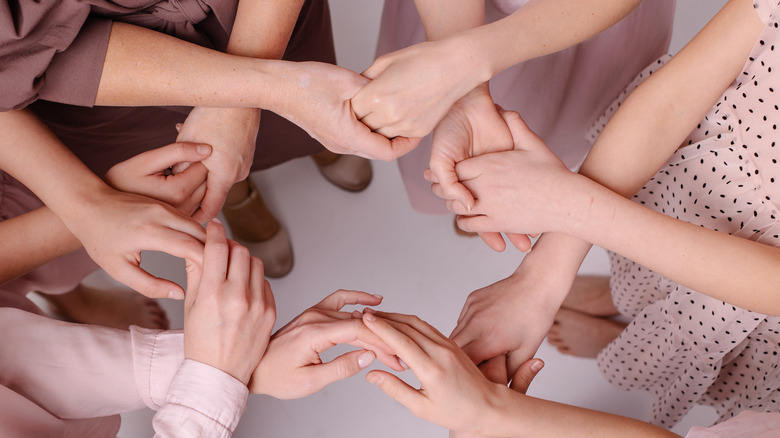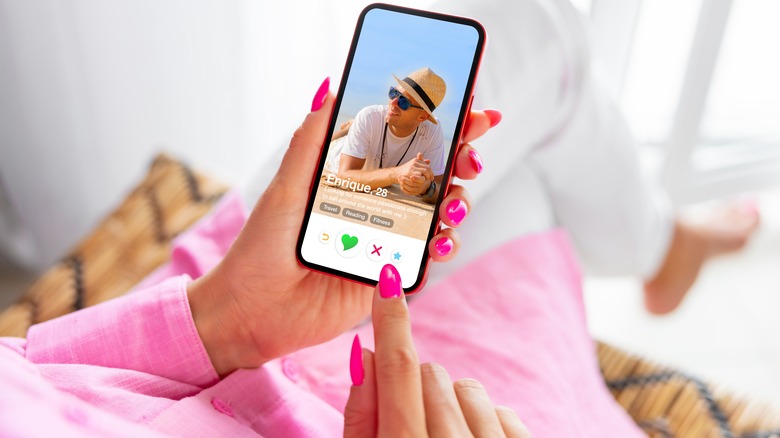Are We Dating The Same Guy? Facebook Groups Are Asking And The Answers Are Complicated
Can you imagine buying something new, attending a restaurant you've never been to, or using a service without looking at online reviews? For a lot of us, the answer is no; reviews are how we ensure quality, make sure we aren't being scammed, and get useful tips from experienced consumers. Intriguingly, a group on Facebook is applying the idea of online reviews to a whole new circumstance: the dating world. The group called 'Are We Dating the Same Guy' is a space where mainly women who date men seek and share opinions about the men they are dating or have dated, largely in an effort to be warned or warn others about potential bad dates. Women can post a picture of their date to the group and ask for any red flags about the person they're dating, or other general advice from other women who have dated them.
These groups certainly have their uses beyond red-flagging serial cheaters. Women can warn others about personal experiences of harassment, threats, aggression, or sexual violence with that person. In this way, 'Are We Dating the Same Guy' operates as a protective group – women watching each other's backs and preventing dangerous dating situations. On the other hand, there are some questions that need to be explored, for instance, how secure is the information provided in the group? Are you infringing on that person's rights to privacy? Also, everyone's definition of a bad date is different – are men being villainized unfairly in some situations?
Women watching out for one another is always a good thing
With groups now in most major cities, 'Are We Dating the Same Guy' has gained a lot of popularity, with over 110,000 members currently in the New York City group alone. To join one of the private groups, individuals must complete a pre-screen survey and adhere to a strict set of guidelines that includes no doxing or posting personally identifiable information about anyone, no bullying, and no sharing information with outsiders.
With the rising popularity of dating apps, research studies are emerging on the prevalence of dating-app-assisted sexual assaults. For instance, Brigham Young University nursing professors recently conducted a study that found 14% of the 1,968 reported acquaintance rapes in Utah had occurred during an initial date with someone met through a dating app. Disturbingly, those attacks were also significantly more violent than others.
When Em Rina, author of the dating memoir "Girl Get The Wine" joined the Facebook group out of curiosity, she was surprised by the comments she received after posting about a man she met online, including stories about him seeming nice at first and then getting "scarily possessive and dominating right after"(via Mashable). Suffice it to say, women and users of dating apps can benefit greatly from increased protection in their dating lives. Tinder's recent relaunching of its app – with the help of RAINN – to improve the reporting process and resources for survivors of sexual abuse and assault was a step forward but doesn't make headway on prevention. That's where Facebook's 'Are We Dating the Same Guy' comes in.
Are there drawbacks to vetting your date this way?
What harm can come out of publicly shaming a person who has done awful things on a date? The problem is everyone's definition of an awful date is different. Online reviews in general are deeply subjective but also very powerful; one person's bad review –- out of hundreds of positive reviews -– about finding something undesirable in their food at a restaurant is enough to make many people second guess eating there. In 'Are We Dating the Same Guy,' is it fair for one woman to trash a rude or annoying date to the entire group? Per Mashable, Dr. Jess Carbino, a former sociologist at Tinder and Bumble, warns, "People could be seeking retribution or fabricating the whole story; there is no way to discern the truth. Also, this isn't the right place to air stories of abuse, authorities, and people who can make real change need to be involved."
Ethical reasons aside, there could be a legal rationale for why posting someone else's photos or personal information is risky. While it's in the group's guidelines not to relay any information to outsiders, there are bound to be people who share what they learned in the group with others, which could include your date. While many publicly posted pictures on social media can be reposted without permission, if someone posts a photo that was sent to them privately by their date, they could be infringing on that person's legal right to privacy and could face a privacy or defamation lawsuit if that person finds out.


